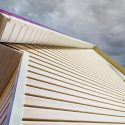Your local climate should be factored into your decision when choosing the right siding for your home. In this post, we discuss how the climate and weather conditions in your area can affect the performance of your siding.

Different Types of Siding
When it comes to siding options, there’s no one-size-fits-all solution. Each material has its unique benefits and drawbacks depending on the climate where you live. To make the best decision, let’s take a look at the most common siding types.
- Vinyl siding is a popular choice for homeowners due to its affordability and low maintenance. However, it can be prone to warping and cracking in extreme temperature fluctuations, making it less ideal for hot or cold climates.
- Fiber cement siding is known for its durability and resistance to moisture and pests. This material is versatile and performs well in various climates, even in areas with extreme temperature changes.
- Wood siding offers a classic, timeless look but requires more maintenance than other materials. Wood is susceptible to rot, pests and moisture damage, particularly in damp, humid climates.
- Metal siding is a durable, low-maintenance option. Aluminum and steel siding can perform well in various climates, but they may be more prone to denting and scratching in areas with high winds or hail.
Climate Factors to Consider
Beyond material, there are several climate factors to keep in mind when choosing your siding.
Temperature Fluctuations
Temperature fluctuations can cause certain materials to expand and contract, leading to cracks, warping or other kinds of damage. Look for siding materials proven to perform well in your area’s temperatures.
Precipitation Levels
Precipitation levels are crucial in siding selection as moisture can cause rot, mold or warping issues. Select a material known for moisture resistance appropriate for the average rainfall in your area.
Sun Exposure
Sun exposure affects siding as UV rays can cause fading or damage certain materials. Consider a siding type with good color retention and UV resistance if your home receives direct sunlight.
Importance of Proper Installation
No matter your choice, proper installation is crucial for optimal performance in your climate. Ensure a professional contractor handles the installation to prevent issues caused by improper installation.
Maintenance and Durability
Climate can impact your siding’s lifespan, and different materials require varying maintenance levels. Work with reliable siding experts for regular inspections and repairs to extend your siding’s life.
Energy Efficiency and Insulation
Siding materials can also influence your home’s energy efficiency in different climates. Factor in the material’s insulation qualities and energy performance when choosing.
Aesthetic Considerations
Don’t forget to balance the siding’s function and style to find the perfect match for your home’s design and climate-specific needs.
To help you make an informed decision, contact Lask Exterior Solutions, LLC in Rockford, IL. Call (815) 964-2220 or contact us online for expert guidance on your siding replacement project.
